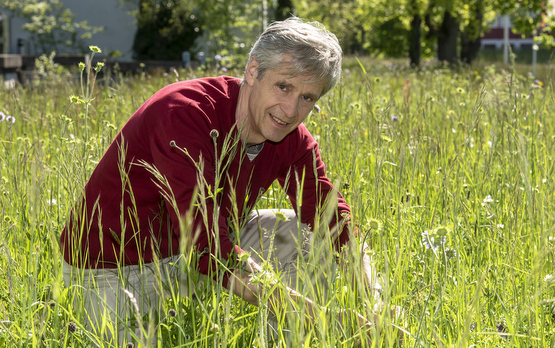Andreas Lüscher represents the EGF and Agroscope on the organising committee of the EGF-Eucarpia Symposium 2019.
Grassland plays a crucial role in the agricultural sector in Switzerland, where the importance of grassland-based forage production is undisputed. Grassland research and development encompasses various disciplines: forage-plant breeding and production, grassland management, biodiversity and ecophysiology. “When choosing my field of work” says Andreas Lüscher, “meadows came out on top; I am fascinated by these ecosystems, not to mention their multiple functions and their economic importance.” Ddescribing how he came to spend so many years working in forage-production and grassland research, Andreas points to the appeal of the direct connection with livestock and food production. Many people think that meadows are beautiful – but what else does one need to be successful in fodder-production research? “To be the sort of person who can get excited about a research topic – and to have plenty of curiosity as well as tenacity” replies Lüscher.
Andreas’ career started with a degree in agronomy, followed by an ecophysiological dissertation on the overwintering of white clover, with Prof. Josef Nösberger at the ETH Zurich as his supervisor. Next came a postdoctoral stay at a forage-plant breeder’s research group in Montpellier, France, where Andreas researched the co-evolution (i.e. the reciprocal adaptation) of various clover and grass ecotypes in a permanent pasture at the National Centre for Scientific Research (CNRS). Back in Switzerland and once again at the ETH Zurich, he investigated the implications of raised atmospheric CO2 concentrations for grassland ecosystems and lectured in forage production. To this day, he maintains a close research and teaching relationship with the ETH. In 2001, he arrived at the Swiss Federal Research Station for Agroecology and Agriculture FAL – a predecessor institution of Agroscope – where he took over the reins of the ‘Forage Production and Grassland Systems’ Research Group.
“Experience and findings from these different spheres are mutually enriching.”
Andreas has fond memories of 2009 and his six-month sabbatical at Teagasc, Ireland’s research institute for agriculture and food development. There, he researched forage production – of course – and expanded his professional network. Another career experience which he recalls fondly is a national congress in Iceland, where he was an invited guest speaker. He was impressed by how the congress operated: in addition to university professors and scientists, extension workers and farmers also took part. After the specialist presentations, the scientific experts were allocated offices, so that interested people could drop by and talk with them. “This uncomplicated and direct knowledge exchange between people of such different backgrounds was impressive, and really appealed to me.”
From international basic research, to exciting application-oriented research, and ultimately to the direct transfer of research findings to farmers: Andreas finds national- and international-level research work across such a wide range of subjects to be a continuous source of enthusiasm and motivation. “Experience and findings from these different spheres are mutually enriching. That’s why I hope that in future, systemic grassland research will continue to be accorded sufficiently high priority to enable us to carry on doing it satisfactorily.”
"In terms of the cultivation of mixtures as well as the excellent cooperation among the research sector, seed trade, extension workers, and ultimately farmers, Switzerland is unique, and sets an example internationally”
Andreas Lüscher represents Agroscope and the European Grassland Federation (EGF) on the organising committee of the EGF-Eucarpia Symposium 2019 . He describes the annual EGF conferences as the most important scientific event in Europe for managed grassland systems. He thinks it’s a fantastic development that EGF and Eucarpia, the two European scientific organisations for grassland sciences and forage-plant breeding, are organising the 2019 symposium jointly. “Eucarpia members breed the forage plants that we then grow on the sown grasslands” he explains. “This technical linking of several research areas is valuable and important.” The symposium provides the opportunity for interesting discussions and new collaborations across both disciplines.
It is also a personal concern of his that the symposium should provide the pan-European research community with a forum for discussing new approaches to meadow and pasture management which would improve both the production of high-quality forage and the varied ecosystem services offered by meadows and pastures. In addition, these symposia always provide attendees with an insight into the forage-production systems and strategies of the host country in question. In Switzerland, the cultivation of grass-clover mixtures is traditional; numerous recent research papers corroborate the major advantages of this system. “In terms of the cultivation of mixtures as well as the excellent cooperation among the research sector, seed trade, extension workers, and ultimately farmers, Switzerland is unique, and sets an example internationally” says Lüscher – mentioning that the Swiss Grassland Society (AGFF) – a specialist organisation and platform – plays a central role in this close collaboration.






